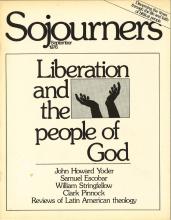Our failure to criticize capitalism in its operation -- the shoddy record of production for obsolescence, the reckless depletion of natural resources, the prizing of profit over sensitivity to worker’s needs, the bribery of multinational corporations ... gave way to a one-way street for Marxists to criticize capitalism.
The critique of capitalism given in the above quote, which to me seems self-evidently accurate, are the words of none other than Carl F. H. Henry, noted evangelical theologian, in the April 1976 issue of Sojourners. To be sure, Dr. Henry believes that capitalism has certain strengths, and he would like to see its deficiencies reformed. But his straight-forward critique is surprising precisely because it has been so infrequently uttered in much of modern American Christendom.
There is, quite plainly, a capitalist captivity of the American church. The values which support capitalism seem lodged in the marrow of our bones. Our national ethos tells us that freedom and individualism are functions of economic free enterprise and competition. The drive to maximize wealth is what builds economic prosperity for all, we are told, and possessive acquisitiveness insures continued expansion and growth.
Christians for the most part have simply not raised fundamental questions about economics. Yet, this is what seems most questionable, biblically, about the foundational values of American society.
There is a glaring dissonance between the life Christ calls his disciples to in his kingdom and the values enshrined daily by capitalism. A simple reading of the Gospels and the book of Acts make this plain.
Read the Full Article

